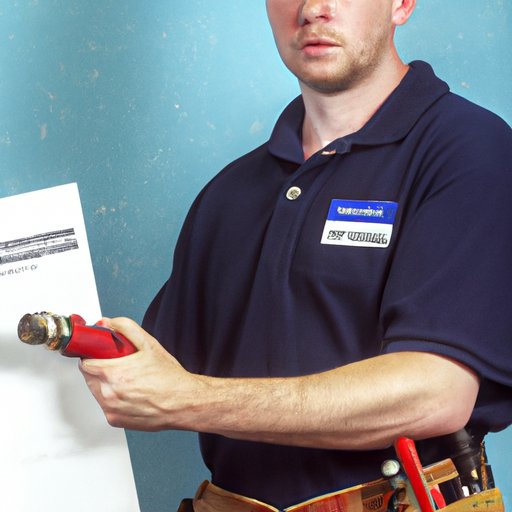I. Introduction
Plumbing is a career that provides an essential service to every community. A plumber is responsible for installing and fixing pipes, fixtures, and fittings that carry water, steam, gas or liquids. Becoming a plumber can be an excellent career choice for those looking for a skilled trade that offers job security, competitive pay, and work satisfaction. In this guide, we will provide a comprehensive overview of the steps needed to become a plumber, an understanding of the occupation and its responsibilities and the pros and cons of entering the plumbing industry.
II. The Ultimate Guide: How to Become a Plumber
Plumbing is a highly skilled occupation that requires education, experience, and certification. Here, we will outline the primary steps to follow to become a licensed plumber:
- Educational Requirements: A high school diploma or equivalent is necessary to become a plumber. Math and science are crucial components of the job, so pursuing classes in these areas can be beneficial. Trade schools or vocational programs are also perfect for gaining plumbing knowledge and job experience. Some programs offer certifications or associate degrees that can accelerate the training process.
- Apprenticeship: Completing an apprenticeship program is an essential part of becoming a plumber. Apprenticeships provide on-the-job training and usually last four to five years. Plumbers work alongside certified professionals to gain the necessary experience and knowledge of plumbing skills, materials, and equipment. Apprenticeships are commonly organized through labor unions, plumbing trade organizations, or plumbing companies. Some states require a specific number of apprenticeship hours before qualifying for a plumber’s license.
- Licensing: After completing apprenticeship, a final exam must be passed to gain a plumbing license. License requirements depend on the state, but typically include a written exam and practical demonstration of plumbing skills.
- Certification: A plumber may also opt for additional certifications to specialize in particular areas of plumbing such as steam fitting or gas technician. These certifications can take less time than an apprenticeship but require coursework and a certification exam.
III. Understanding the Duties and Responsibilities of a Plumber
As mentioned, the primary responsibilities of a plumber include installing and repairing pipes and fixtures to regulate the supply of gas, water, and steam. A plumber may perform the following duties:
- Install and repair pipes and fixtures
- Diagnose and troubleshoot potential plumbing problems
- Inspect plumbing systems to determine their condition and need for repair or replacement
- Adhere to building codes and regulations when installing new systems
- Collaborate with other construction professionals such as architects or electricians
Plumbers may also specialize in different areas based on the type of plumbing work they perform. For example, plumbers may focus on residential plumbing, commercial plumbing, or industrial plumbing. Plumbers may also concentrate on specific types of plumbing that involve gas or steam.
IV. Breaking into the Plumbing Industry: Tips and Advice
The plumbing industry is vast and diverse. Here are some tips for those wanting to break into this challenging field:
- Get Your Foot in The Door: Aspirants can start by applying for entry-level positions in plumbing companies or local plumbing unions. During this process, the individual will undertake small jobs like cleaning work areas, fixing slow drains, and so forth.
- Networking: Take advantage of networking opportunities to build relationships within the industry. Attend trade shows or join associations to expand contacts and skills.
- Find a Mentor: Finding a more experienced plumber to guide on the journey can be beneficial. A mentor can expose them to different types of plumbing work, share experiences and offer valuable guidance.
- Build Plumbing Skills: Possessing a broad range of plumbing skills can increase work opportunities. Plumbers should focus on learning new technologies, tools, and equipment in the trade.
V. The Pros and Cons of Becoming a Plumber
Like any career, plumbing has its positives and negatives:
- Pros:
- Job security and steady employment due to the increasing demand for plumbers
- Competitive pay and employment benefits
- Client interaction as they consult you on their plumbing issues
- Job stability even during economic downturns, as plumbing work is needed in all circumstances.
- Cons:
- Physical exertion and potential work hazards including handling asbestos and contaminated debris
- Work schedules can be unpredictable and depend on clients’ availability, which may affect personal life plans.
VI. Interviews with Experienced Plumbers: What it Takes to Succeed
Success in the plumbing industry depends on experience, skill, and a passion for the trade. In this section, we share insights from some experienced plumbers who provide tips and advice for succeeding in the field:
“Aaron, a master plumber with over 10 years of experience, advises aspiring plumbers to focus on customer relationships. He says that a happy customer is a great asset to any plumber – word of mouth generates work both in residential and commercial plumbing. He suggests that offering maintenance plumbing services, something many don’t do, is a profitable niche to pursue.”
“Sophie, who specializes in industrial plumbing, advises aspiring plumbers to stay updated with the latest plumbing technology and attend trade shows to gain new skills. She believes that regulations and plumbing standards are evolving, and it’s essential to build expertise for long-term success. “
VII. Conclusion
Plumbing is an essential occupation that caters to the everyday needs of society. A career in plumbing can be rewarding, lucrative, and provide job security. To become a skilled, certified plumber, aspirants should follow the necessary steps, gain experience through apprenticeships, and seek industry advice to improve their skills. Although there may be challenges in plumbing, the industry remains a valuable pursuit for those interested in skilled trades and helping people.
